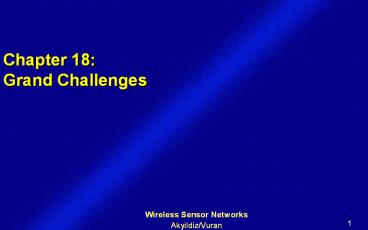Chapter 18: Grand Challenges PowerPoint PPT Presentation
1 / 19
Title: Chapter 18: Grand Challenges
1
Chapter 18Grand Challenges
2
Grand Challenges How Make the WSNs Billion Dollar
Industry
- GRAND CHALLENGE
- ENERGY
- ENERGY
- ENERGY
- Extremely energy-efficient solutions
- In both existing and future solutions for WSNs,
energy efficiency is the grand challenge.
3
GRAND CHALLENGE
Traditional layered approach is not suitable for
WSNs!
Cross-Layer Melting
- Traditional Approach
Our View
4
XLP Cross-Layer Protocol
MC Vuran and I.F. Akyildiz, XLP A Cross Layer
Protocol for Efficient Communication in
WSNs, IEEE Tr. on Mobile Computing, Nov.
2010. Prelim version Proc. of Int. Conf on Info
Science and Systems, Princeton, March 2006.
- Initiative Concept
- Receiver Contention
- Local Congestion Control
- Angle-based Routing
- Channel Adaptive Operation
- Duty Cycle Operation
XLP Cross Layer Protocol
5
XLP Comparison with 5 Different Layered Protocol
Stacks
- Energy consumption ? avg. 65 reduction
- Throughput ? avg. 32 increment
- Latency ? avg. 5 increment (tradeoff)
- Goodput ? avg. 39 increment
- Implementation ? avg. 15 reduction in code space
6
GRAND CHALLENGE
HOW TO REALIZE THE MAPPING??
- User Requirements/
- Applications
- Architecture
- and Topology
- Communication
- Protocols
7
FURTHER GRAND CHALLENGES
- Cost Reduction to CENTS ??
- Deployment (Architecture) Decisions
- (optimum of sensors, optimum of sinks,
- optimal locations, fast deployment,
reusability, - terrain considerations)
8
FURTHER GRAND CHALLENGES
- How to operate and maintain these networks?
- Simple Network Management Tools?
- How to solve the ENERGY problem?
- How to deal with the SCALABILITY problem?
9
FURTHER GRAND CHALLENGES
- How to deal with TERABYTE of sensed
information?? - Network Monitoring and Management
- How to integrate WSNs into NGWI ?
10
Wireless Networking The Big Picture
- Cellular Networks
- 2G
- 2.5G
- 3G
- 4G?
- WLAN
- Wireless Mesh Networks
- WiMAX
- Wireless Sensor Networks
- Cognitive Radio Networks
11
The Future
12
Integration of Sensor Networks and the Internet
- Sensor networks are developed in isolation so far
- Recent attempts in integrating WSNs with Internet
- 6LoWPAN IPv6 for WSNs
- IPv6 packet header is compressed to sizes that
are suitable for - sensor devices
- Efficient integration for communication between
an IPv6-based - device and a sensor device
- Significant challenges still exist in seamless
integration !!
13
Integration of Sensor Networks and the Internet
- Coexistence of WLANs and WSNs at the MAC layer
- End-to-end routing between a sensor device and an
Internet device - Existing transport layer solutions for WSNs are
not compatible with the TCP and UDP protocols - Adaptive transport protocols required for
seamless reliable transport of event features
throughout the WSN and next-generation wireless
Internet
14
Integration of Sensor Networks and the Internet
- Internet protocols are generally prone to energy
and memory inefficiency - c.f. WSN protocols tailored to provide high
energy and memory efficiency - Fundamental differences in design principles
necessitate novel solutions - Significant modifications in each network are
required to provide seamless operation
15
Wireless Sensor and Actor NetworksI. F. Akyildiz
and I. H. Kasimoglu, Wireless sensor and actor
networks Research challenges, Ad Hoc
Networks, 2(4)351367, October 2004.
- Most WSNs focus on data gathering
- Wireless sensor and actor networks (WSANs) and,
eventually, - cyber-physical systems (CPS)
- Recent developments in robotics
- Need to perform specialized tasks, .e.g., acting
on environment - based on sensed events
16
Wireless Sensor Actor Network Challenges
- SensorActor Coordination
- Algorithms that can provide ordering,
synchronization, and elimination of the
redundancy of actions - ActorActor Coordination
- A unified framework that can be exploited by
different applications to always select the best
networking paradigm available - Analytic framework to characterize the three
planes, i.e., the management, coordination, and
communication planes in WSANs - Cross-layer communication for effective sensing,
data transmission, and acting
17
Wireless Multimedia Sensor Networks (WMSNs)I. F.
Akyildiz, T. Melodia, and K. Chowdury, A
Survey on Wireless Multimedia Sensor Networks,
Computer Networks, (Elsevier), 51(4) 921-960,
March 2007
- Recent progress in CMOS technology has enabled
the development of single chip camera modules - Microphones have for long been used as an
integral part of wireless sensor nodes - Focus of research in digital signal processing,
communication networking, and control
18
WMSNs Challenges
- Aggregation and fusion of both inter-media and
intra-media are necessary - Tradeoffs between compression at end-nodes and
communicating raw data have yet to be clearly
analyzed - At the physical layer, UWB communication for
point-to-point links has been successfully
accomplished. - Multi-hop communication through the UWB
technology is still an open research issue - Comprehensive analytical models are needed to
quantitatively compare different variants of UWB
and determine
19
Wireless Sensor Networks in Challenging
Environments
- Underwater Wireless Sensor Networks (UWSNs)
- Wireless Underground Sensor Networks (WUSNs)
- I. F. Akyildiz, D. Pompili, and T. Melodia,
- Underwater acoustic sensor networks research
challenges, - Ad Hoc Networks (Elsevier) Journal, 3(3)257-279,
March 2005. - F. Akyildiz and E. P. Stuntebeck,
- Wireless underground sensor networks research
challenges, - Ad Hoc Networks (Elsevier) Journal, 4669686,
July 2006.

